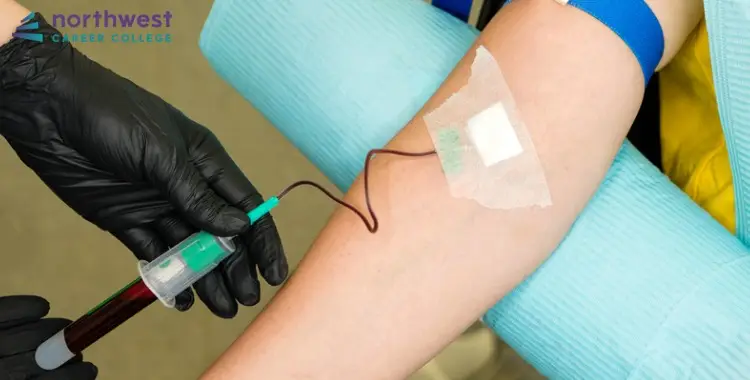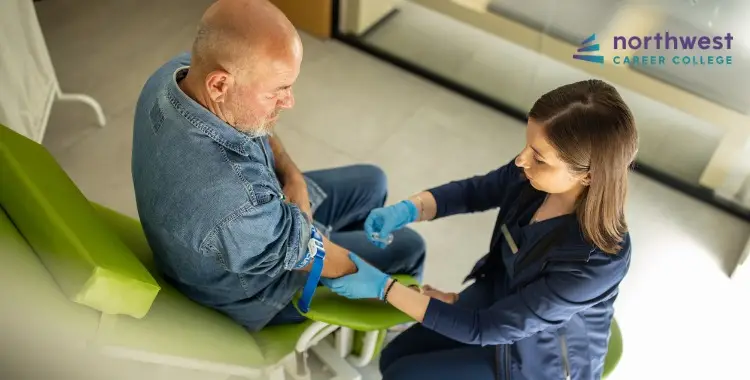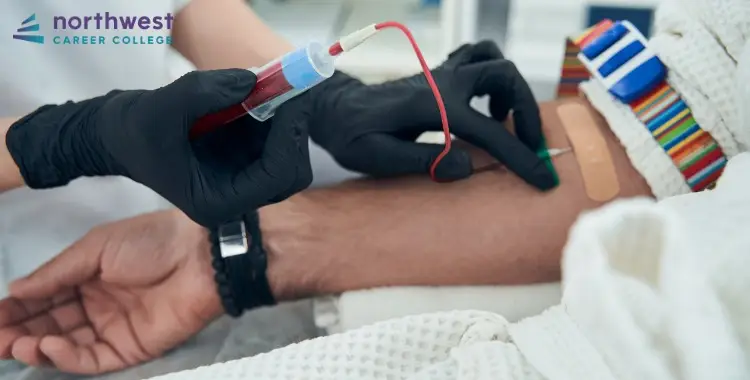Phlebotomy Technician: What You Need to Know
- Phlebotomy Technician
- November 4, 2024
- 1.3k views
- 3 min read

Phlebotomy Technicians are vital healthcare professionals inside hospitals who draw blood from patients for medical testing, transfusions, research, or donations.
According to the Bureau of Labor Statistics, the employment of phlebotomists is projected to grow 10% from 2021 to 2031, faster than the average for all occupations. This growth will add more stability and reward to this career.
In this blog, we will tackle all the essential things you might find helpful in learning more about the role of a phlebotomy technician and explain why this position is so crucial in healthcare.
This blog will define the role of a phlebotomy technician and explain why this position is so crucial in healthcare.
Table of Contents
What is a Phlebotomy Technician?
Phlebotomists are specially trained to draw blood safely and hygienically from patients. Some places they work in include hospitals, laboratories, clinics, and blood donation centers. The significant tasks a phlebotomist carries out include the following:
Blood Drawing
A phlebotomist draws blood from patients using needles, technically called venipuncture. They also collect blood using fingersticks, often for faster tests like blood sugar monitoring.
Blood sample handling involves labeling and storing appropriately after phlebotomists obtain samples. This ensures the samples will reach the laboratory for testing. It requires attention to detail, as mislabeling would lead to wrong results.
Infection Control
The phlebotomist follows stringent rules to prevent infectious contamination. This is done by sterilizing all equipment that comes into contact with blood, wearing gloves for protection, and disposing of needles and other materials appropriately.
Patient Interaction
Many times, phlebotomists deal directly with patients, most of whom might feel apprehensive or scared due to the blood being drawn from them. It is necessary to ease them and explain the procedure to them as calmly as possible.
Phlebotomy Technician Work Environment
Different healthcare facilities where phlebotomists practice include hospitals, clinics, diagnostic laboratories, and blood donation centers.
Some phlebotomists may work in research laboratories or mobile blood donation buses and vans. Regardless of the facility, phlebotomists are essential to help ensure the proper completion of blood tests, among other procedures.
- Hospitals
- Diagnostic labs
- Outpatient clinics
- Blood Banks
For this reason, phlebotomists may work with other medical workers, such as nurses and doctors, to ensure that the patient receives optimum care.
Phlebotomy Technician – Skills and Training
Since then, the profession of a phlebotomy technician required special training. Northwest Career College’s phlebotomy program merges online learning with hands-on training and prepares students for certification in three months. The primary skills a phlebotomist is required to perform are the following:
- Venipuncture Skills
- Patient Care and Communication Skills
- Infection Control and Safety
- Ethical Behavior
Conclusion
The phlebotomy technician career provides an exciting opportunity to serve in a vital role in healthcare. Phlebotomists are responsible for blood draws, handling samples, and ensuring smooth patient care.
With the high demand for phlebotomists and the opportunity to graduate in as little as three months, now is a great time to start this career.
Have you ever considered training at Northwest Career College for the skills and certification you need to enter this exciting career? Our flexible program, hands-on training, and student assistance options make it easy to become a phlebotomist!





